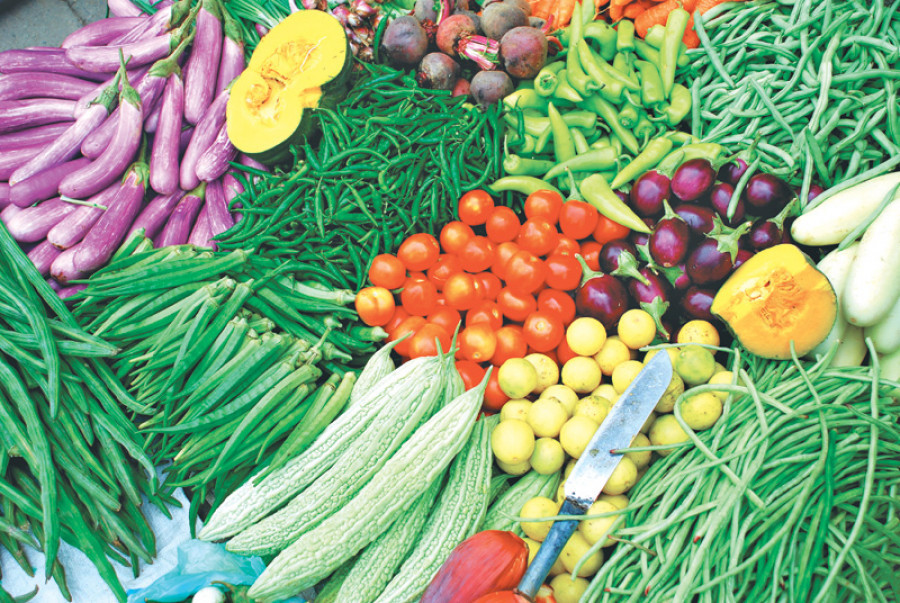Money
Vegetables to be sold at 11 designated sites as Kalimati bazaar is shuttered
Outlets to be opened at Kalanki, Baphal, Swayambhu, Banasthali, Gongabu, Basundhara, Tinkune, Gopi Krishna, Lainchaur, Ratna Park and Koteshwor.
Krishana Prasain
The Kalimati vegetable bazaar, which keeps Kathmandu's homes supplied with fresh produce, has pulled down the shutters to comply with social distancing rules. The crowds were getting too big, raising contamination worries, said officials.
The Kalimati Fruits and Vegetables Market Development Board shut down all sales at the country’s largest vegetable and fruit market from Thursday after Kathmandu Metropolitan City expressed concern over the large number of shoppers gathering at close quarters.
According to Binaya Shrestha, deputy director of the board, vegetables and fruits from the market will be distributed at 11 places fixed by Kathmandu Metropolitan City.
“The operation system of the market has been changed considering the critical and risky situation. The market has transformed its role from that of a wholesaler to that of a distributor,” he said, adding that vegetables arriving at the market would be sold at various locations in Kathmandu.
City authorities decided to close down the market as there was no checking system while large crowds collected and Indian trucks transporting vegetables were arriving daily, said Ishwor Man Dangol, spokesperson for Kathmandu Metropolitan City.
Potential locations for the vegetable markets have been identified, but they have not opened as officials are looking for outlets with basic facilities like toilets and drinking water.
“We are holding discussions about the exact places to operate the market, and we will come to a decision within a day or two,” he said.
Officials of the District Administration Office and related agencies met on April 6 and decided to open outlets for fresh produce at various places to avoid throngs at Kalimati.
Kathmandu Metropolitan City has designated Kalanki, Baphal, Swayambhu, Banasthali, Gongabu, Basundhara, Tinkune, Gopi Krishna, Lainchaur, Ratna Park and Koteshwor as sites for the vegetable outlets. The markets will remain open from 2 to 8 am.
Initially, vegetables will be sold from the trucks transporting them at the specified locations, Dangol said. Giving up vegetables for a few days will not harm anyone, he added.
Shrestha said they had tried various methods to prevent crowding at the Kalimati market, but they did not work. It used to open from 2 to 7 am till Wednesday.
Retail stores had been closed from March 29, and motorcycles were not permitted to enter the premises. City officials said they decided to spread out the vegetable outlets so people would not have to travel to Kalimati and mix with crowds and put themselves and others at risk.
Shrestha said the market receives 300-450 tonnes of vegetables daily. The supply has decreased due to the lockdown. The market received 280 tonnes of vegetables on Wednesday, he said.
Shrestha added that the vegetables would be sold from the places fixed by Kathmandu Metropolitan City. This may help to bring down prices too, he said. Farmers and suppliers will also be able to sell their products at these locations.
The valley's second largest vegetable market at Balkhu has also barred entry of people travelling on foot or by motorcycle. Resham Tamang, administrator of the Balkhu Agriculture Vegetables Market, said only people travelling by car could enter the market.
According to him, security guards and surveillance cameras monitor the market to make sure safety regulations are being followed. Sellers are required to wear masks and gloves, and use hand sanitisers.
Tamang said that the market receives 200-250 tonnes of vegetables daily with shipments becoming smaller in the past few days.
But the available supply is sufficient to meet the valley's requirement with restaurants and hotels closed and many people having left the valley for their home towns, he added. Tamang said that shipments from India stopped arriving several days ago.




 20.12°C Kathmandu
20.12°C Kathmandu














